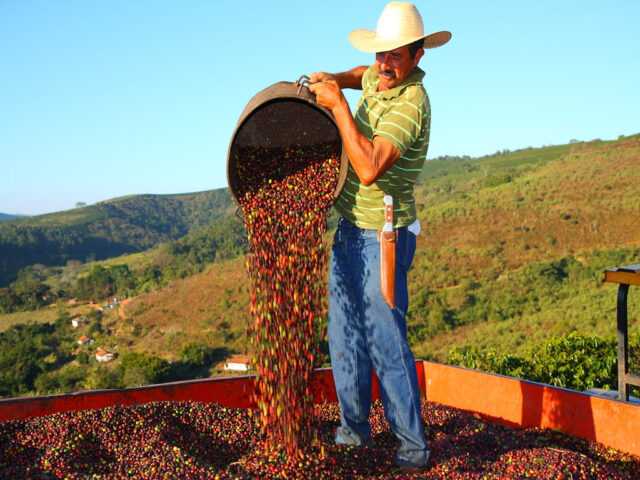SAO PAULO, Brazil – The harvesting of the 2021/22 crop of arabica coffee began in many regions of Brazil in mid-May. Activities should gradually increase in the coming weeks, with the peak of harvest expected between mid-June and early July, according to agents consulted by Cepea. Despite the beginning of the harvesting, arabica prices increased in Brazil in May. On May 31, the CEPEA/ESALQ Index for arabica coffee (delivered to São Paulo city) closed at 877.41 BRL (167.93 USD)/bag, a staggering 94.82 Reais per bag up (+12.1%) compared to that on April 30.
The major reasons for these valuations were the absence of sellers in the Brazilian market and increases in the future contracts for arabica coffee at ICE Futures (New York Stock Exchange). Brazilian coffee farmers have already sold a high volume of the 2020/21 output and are now focused on crops. Besides, farmers expect prices to increase more, based on forecasts for low supply in 2021.
Abroad, arabica futures were influenced by expectations for a crop failure in Brazil in the 2021/22 season, the drier weather (observed since April) and problems in other coffee-producing countries, such as Colombia, Honduras and Guatemala. On May 25, Conab (Brazil’s National Company for Food Supply) released its 2nd Crops Survey, estimating the Brazilian harvest at 48.81 million bags (60 kilograms each), 22.6% down from that in the previous season.
Robusta harvesting in Brazil
Prices for robusta coffee increased in the Brazilian market in May too, despite the harvesting. In Espírito Santo (ES), activities were slow, and the volume harvested until May 21 was somewhere between 10 and 20%. According to agents, the peak of harvest in this state should occur in June. On the other hand, in Rondônia, activities advanced more, and almost 50% of the 2021/22 crop had been harvested until May 21.
Although the harvesting pace was increasing late in the month, small amounts were arriving at the market, which underpinned prices. Between April 30 and May 31, the CEPEA/ESALQ Index for the robusta type 6, screen 13, Espírito Santo, rose by 20.35 Reais/bag (+4.4%), closing at 476.32 BRL (91.16 USD)/bag on May 31.
Until the end of the month, robusta farmers were prioritizing scheduled deliveries, waiting for higher valuations to return to the market, since many of them have made some cash flow this season. Despite the forecast for an increase in the Brazilian supply of robusta in 2021/22, many farmers still believe prices will be higher this year, since the arabica crop failure may boost the demand from processors for robusta coffee.
Exports
The Brazilian exports of the 2020/21 coffee crop have been high and may set a new record. According to data from Cecafé (Coffee Exporters Council), although shipments (green, roasted and grounded beans and soluble) decreased by 13% between March and April, the volume sent to the international market in April was still high, totaling 3.3 million bags of 60 kilos each.
Thus, this season (July/20 to April/21), exports have already reached 39.5 million bags, a staggering 16.6% up from that in the same period of the 2019/20 season and 14.8% higher than that from 2018/19, when Brazil shipped 41.4 million bags at the end of the season, a record in the series of Cecafé.
As regards the national exports of green beans, Brazil has shipped 36.1 million bags this season, 18.4% up from that in the same period of the previous season (Cecafé). Concerning arabica coffee, exports increased by 18.1% in the same period, totaling 32.1 million bags in the current season, and as for robusta coffee, shipments have totaled 4 million bags, 20.7% up from that in the 2019/20 season.
Despite the expectations for a record volume, lower exports in April reflected the offseason in Brazil and the restrictive measures imposed by the covid-19 pandemic, largely in Europe. On the other hand, most agents from the sector have positive expectations about the demand in 2021, due to the advance in the vaccination in important coffee-consuming countries. In general, the weak Real against the strong dollar continues to favor Brazilian exports.


















